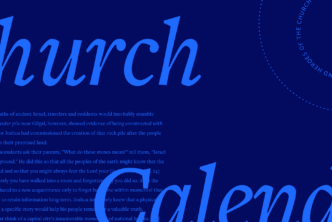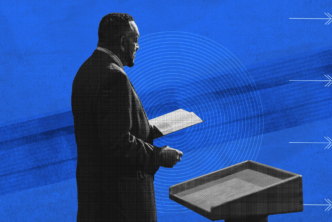Today marks the beginning of the Days of Remembrance, the United States’ annual commemoration of the Holocaust.
Between 1933 and 1945, the Nazi regime systematically persecuted and murdered an estimated six million Jews, as well as millions of others it deemed “politically, racially, or socially unfit.”1 Though well documented, the horrors of the Holocaust remain unfathomable.
Amid those dark days shine innumerable stories of courage and humanity, some told and some known only to God. (Who knows every prisoner who gave away his last piece of bread to a weaker brother? Their memory is precious in the mind of God.)
One told story of valor is that of Dietrich Bonhoeffer, a German Christian, pastor, pacifist, and Nazi resister. Though living safely in the United States in 1939, Bonhoeffer felt compelled to return to Germany:
I must live through this difficult period in our national history with the people of Germany. I will have no right to participate in the reconstruction of Christian life in Germany after the war if I do not share the trials of this time with my people.
He boarded the last scheduled steamer to cross the Atlantic and soon joined resistance efforts, for which he was eventually imprisoned and executed.2
In the below excerpt from Letters and Papers from Prison, Bonhoeffer offers a beautiful reflection on sharing in the sufferings of others.
The Holocaust has passed, but its memory remains, and similar evils are repeating. Will we have the Christian courage to enter into the suffering of our neighbors?
***
Sympathy
We have to consider that most people learn wisdom only through personal experiences. This explains, first, the astonishing inability of most people to take any kind of preventive action—one always believes that he can evade the danger until it is too late. Second, it explains people’s dull sensitivity toward the suffering of others; sympathy grows in proportion to the increasing fear of the threatening proximity of disaster.
There is some justification in ethics for such an attitude: one does not want to interfere with fate; inner calling and the power to act are given only when things have become serious. No one is responsible for all of the world’s injustice and suffering, nor does one want to establish oneself as the judge of the world. And there is some justification also in psychology: the lack of imagination, sensitivity, and inner alertness is balanced by strong composure, unperturbed energy for work, and great capacity for suffering.
From a Christian perspective, none of these justifications can blind us to the fact that what is decisively lacking here is a greatness of heart. Christ withdrew from suffering until his hour had come; then he walked toward it in freedom, took hold, and overcame it. Christ, so the Scripture tells us, experienced in his own body the whole suffering of all humanity as his own—an incomprehensibly lofty thought!—taking it upon himself in freedom.
Certainly, we are not Christ, nor are we called to redeem the world through our own deed and our own suffering; we are not to burden ourselves with impossible things and torture ourselves with not being able to bear them. We are not lords but instruments in the hands of the Lord of history; we can truly share only in a limited measure in the suffering of others.
We are not Christ, but if we want to be Christians it means that we are to take part in Christ’s greatness of heart, in the responsible action that in freedom lays hold of the hour and faces the danger, and in the true sympathy that springs forth not from fear but from Christ’s freeing and redeeming love for all who suffer. Inactive waiting and dully looking on are not Christian responses. Christians are called to action and sympathy not through their own firsthand experiences but by the immediate experience of their brothers, for whose sake Christ suffered.3
***
This excerpt has been lightly adapted for readability. Learn more about Bonhoeffer and his works.
- “Why We Remember,” United States Holocaust Memorial Museum.
- “Dietrich Bonhoeffer,” Wikipedia.
- Dietrich Bonhoeffer, Dietrich Bonhoeffer Works, Volume 8: Letters and Papers from Prison (Augsburg Fortress, 2009), pg. 48.





